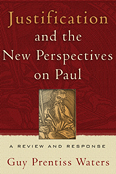
Guy Prentiss Waters
Reviewed by: Cornelis Venema.
Justification and the New Perspectives on Paul: A Review and Response, by Guy Prentiss Waters. Published by P&R Publishing, 2004. Paperback, 273 pages, list price $16.99. Reviewed by Prof. Cornelis Venema.
In this volume, Guy Prentiss Waters, who teaches biblical studies at Belhaven College, offers a comprehensive review of the "new perspectives on Paul." As the subtitle of his work indicates, Waters is interested not only in surveying the new perspectives, but also in critically evaluating them from the standpoint of confessional Reformed theology.
The bulk of Waters's study is taken up with the background to the new perspectives in the last century or more of Pauline studies. After an introductory chapter, which briefly addresses the course of Pauline studies from the Reformation to Albert Schweitzer in the nineteenth century, Waters offers a succession of chapters on various figures of particular importance to the recent emergence of new perspectives on Paul. He ably and persuasively argues that the new perspectives on Paul represent the outcome of a long history of sustained attention to two questions: What was the apostle Paul's relationship to Judaism? And, how central is the doctrine of justification in Paul's epistles? He documents how more recent studies of the apostle Paul have challenged the older Reformation assumptions that Paul's doctrine of justification was formulated in opposition to a kind of Jewish legalism, and that it constitutes the vital center of Paul's theology. In his survey of the history of Pauline studies, Walters provides especially helpful summaries of the contributions of key figures in the formulation of the new perspectives, particularly E. P. Sanders, James D. G. Dunn, and N. T. Wright.
The concluding chapters of Waters's study offers a critique of the new perspectives and an assessment of their importance to Reformed Christianity today. In these chapters, Waters argues that the new perspectives do not properly interpret Paul's theology, and that the Reformation perspective requires fresh defense against its critics, both within and outside of the Reformed community. In the final chapter, Waters also notes some similarities between the new perspectives on Paul and the views of Norman Shepherd and the so-called "Federal Vision." In Waters's judgment, these developments constitute a serious threat to the historic consensus of the Reformed and Presbyterian churches on the doctrine of justification by grace alone through faith alone.
For readers who wish to become acquainted with the historical background to the contemporary debate about the new perspectives on Paul, this book will prove an excellent resource. As a former student of E. P. Sanders and Richard Hays, Waters exhibits throughout an intimate acquaintance with his subject. The usefulness of his study is enhanced by the provision of a fine annotated bibliography of secondary sources on the new perspectives. Waters also offers a helpful critique of the new perspectives from the standpoint of Reformed theology.
However, Waters's concluding chapter, which addresses the possible connections between the new perspectives on Paul and related developments in the Reformed community, is too brief and general to be as helpful as his critique of the new perspectives themselves.
March 01, 2026
February 15, 2026
February 01, 2026
January 25, 2026
January 18, 2026
January 11, 2026
Texts that Transform: Church and Ministry
January 04, 2026
© 2026 The Orthodox Presbyterian Church